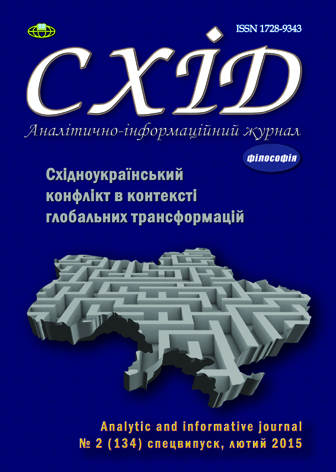Networks, frictions and war machines: methodological notes on the Ukrainian crisis
DOI:
https://doi.org/10.21847/1728-9343.2015.2(134).40189Keywords:
network, actors, interaction, friction, war machine, Ukrainian crisis.Abstract
Study of the current Ukrainian sociopolitical crisis requires addressing a number of epistemological obstacles. This is possible due to the use of methodological tools that can take into account the features of the studied object. A feature of the crisis of social processes is that they take place in the conditions of the loss of state monopoly on the legitimate use of violence. Anti-government protests in the Maidan and armed conflict in the east of Ukraine led to the emergence of many paramilitary social formations, are actively involved in social conflicts.
The paper attempts to study the possibility of using the network theory to investigate the processes of the mobilization and formation of paramilitary formations. Additional theoretical module network theory performs the concept of "war machine." The author tries to describe this concept by means of the most important properties of the studied social objects. The study of the Ukrainian crisis in perspective network theory facilitates redirect research in a more pragmatic direction. According to the author, this approach provides a productive analytical tools for the study of actual social processes and facilitates finding ways out of this situation.
Downloads
References
Comte-Sponville A. (2012), Philosophical Dictionary, Etherna, Moscow, 752 p. (rus).
Haeussling R. (2003), Social processes as network games. Sociological essays on key aspects of the network theory, Logos-Altera, Moscow, 192 p. (rus).
Schubert K. (2004), Logic structure, logic and the logic of the subjects of innovation. The concept of networks and analysis of policy areas in: Methodological approaches of political science research and metatheoretical foundations of political theory, ROSSPEN, Moscow, pp. 199-219 (rus).
Latour B. (2014), Reassembling Social: An Introduction to Actor-Network Theory, Higher School of Economics, Moscow, 384 p. (rus).
Deleuze J., Guattari F. (2010), Thousand Plateaus: Capitalism and Schizophrenia, Astrel, Yekaterinburg, pр. 587-716 (rus).
Delanda M. (2014), War in the age of intelligent machines, Armchair scientist, Yekaterinburg, Moscow, 338 p. (rus).
The Law of Ukraine "On the National Guard of Ukraine" (2015), available at: http://zakon4.rada.gov.ua/laws/show/876-18 (ukr).
Martin van Creveld (2005), Transformation of War, Alpina Biznes Books, Moscow, 344 p. (rus).
Downloads
Published
How to Cite
Issue
Section
License
Copyright (c) 2015 Volodymyr Fadieiev

This work is licensed under a Creative Commons Attribution-NonCommercial-NoDerivatives 4.0 International License.
1. Authors bear responsibility for the accuracy of facts, quotations, numbers and names used.
2. Manuscripts are not sent back.
3. The publisher does not always agree with the authors' opinion.
4. The authors reserve the right to authorship of the work and pass the first publication right of this work to the journal under the terms of a Creative Commons Attribution-NonCommercial-NoDerivatives 4.0 International License. This license allows others to distribute (copy) the published work for non-commercial purposes, provided there is mandatory attribution to its authors and a link to the first publication in our journal.
5. The authors have the right to conclude separate supplement agreements that relate to non-exclusive work distribution in the form in which it has been published by the journal (for example, to upload the work to the online storage of the journal or publish it as part of a monograph), provided that the reference to the first publication of the work in this journal is included.

